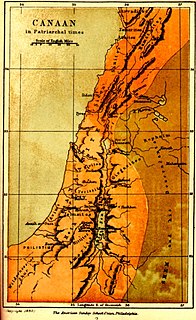Rabbinic Judaism considers some names of God so holy that, once written, they should not be erased: YHWH, Adonai, El ("God"), Elohim, Shaddai ("Almighty"), and Tzevaot ; some also include Ehyeh. Early authorities considered other Hebrew names mere epithets or descriptions of God and wrote that they and names in other languages may be written and erased freely. However, some moderns advise special care even in these cases, and many Orthodox Jews have adopted the chumras of writing "G-d" instead of "God" in English or saying Ṭēt-Vav instead of Yōd-Hē for the number fifteen or Ṭēt-Zayin instead of Yōd-Vav for the number sixteen in Hebrew.

ʼĒl is a Northwest Semitic word meaning "god" or "deity", or referring to any one of multiple major ancient Near Eastern deities. A rarer form, 'ila, represents the predicate form in Old Akkadian and in Amorite. The word is derived from the Proto-Semitic *ʔil-, meaning "god".
Israel is a country in Western Asia.

Elohim is a Hebrew word meaning "gods". Although the word is plural in form, in the Hebrew Bible it usually refers to a single deity, particularly the God of Israel. At other times it refers to deities in the plural.

Elohim City is a private community in Adair County, Oklahoma, United States. The 400 acres (1.6 km2) rural retreat was founded in 1973 by Robert G. Millar, a Canadian immigrant, former Mennonite and an important leader in America's Christian Identity movement, a theology common to an assortment of right-wing extremist groups. The community gained national attention for its ties to members of The Order in the 1980s and with convicted Oklahoma City bomber Timothy McVeigh in the 1990s.

There are various names of God, many of which enumerate the various qualities of a Supreme Being. The English word god is used by multiple religions as a noun to refer to different deities, or specifically to the Supreme Being, as denoted in English by the capitalized and uncapitalized terms God and god. Ancient cognate equivalents for the biblical Hebrew Elohim, one of the most common names of God in the Bible, include proto-Semitic El, biblical Aramaic Elah, and Arabic 'ilah. The personal or proper name for God in many of these languages may either be distinguished from such attributes, or homonymic. For example, in Judaism the tetragrammaton is sometimes related to the ancient Hebrew ehyeh. In the Hebrew Bible, YHWH, the personal name of God, is revealed directly to Moses. Correlation between various theories and interpretation of the name of "the one God", used to signify a monotheistic or ultimate Supreme Being from which all other divine attributes derive, has been a subject of ecumenical discourse between Eastern and Western scholars for over two centuries. In Christian theology the word is considered a personal and a proper name of God. On the other hand, the names of God in a different tradition are sometimes referred to by symbols. The question whether divine names used by different religions are equivalent has been raised and analyzed.
Eliezer was the name of at least three different individuals in the Bible.
Elyon is an epithet of the God of the Israelites in the Hebrew Bible. ʾĒl ʿElyōn is usually rendered in English as "God Most High", and similarly in the Septuagint as ὁ Θεός ὁ ὕψιστος.
Ancient Semitic religion encompasses the polytheistic religions of the Semitic peoples from the ancient Near East, Northeast Africa, and Malta. Since the term Semitic itself represents a rough category when referring to cultures, as opposed to languages, the definitive bounds of the term "ancient Semitic religion" are only approximate.

Genesis 1:1 is the first verse of the first chapter of the Book of Genesis in the Bible and the opening of the Genesis creation narrative.

Genesis 1:2 is the second verse of the Genesis creation narrative. It is a part of the Torah portion Bereshit.

The Canaanite religion was the group of ancient Semitic religions practiced by the Canaanites living in the ancient Levant from at least the early Bronze Age through the first centuries AD. Canaanite religion was polytheistic and, in some cases, monolatristic.

Sons of God is a phrase used in the Hebrew Bible and in Christian Apocrypha. The phrase is also used in Kabbalah where bene elohim are part of different Jewish angelic hierarchies.

The angel of the LORD is an entity appearing repeatedly in the Tanakh on behalf of the God of Israel.
Khomer Mekomi is Hadag Nahash's third studio album, released in 2004.
Yahweh is the national God of the Iron Age kingdoms of Israel and Judah.
Eliana Assyrian/Akkadian, אֱלִיעָנָה (Hebrew), Ηλιάνα (Greek), إليانا (Arabic), is a female given name found with that spelling in Hebrew, Italian, Portuguese and Spanish.

A Divine Council is an assembly of deities over which a higher-level god presides.
11Q13, also 11QMelch or the Melchizedek document, is a fragmentary manuscript among the Dead Sea Scrolls which mentions Melchizedek as leader of God's angels in a war in Heaven against the angels of darkness instead of the more familiar Archangel Michael. The text is an apocalyptic commentary on the Jubilee year of Leviticus 25. The Dead Sea Scrolls contain texts in Hebrew, Aramaic and Greek, the language of 11Q13 is Hebrew, date of composition is circa 100 BCE.

Brasheedah Elohim is an American-Israeli basketball player and tennis player. During her professional women's basketball career in Israel, she played for Ramat HaSharon, Ashdod, Ramla, and Jerusalem. She was a member of the 2016 Israel women's national basketball team.










